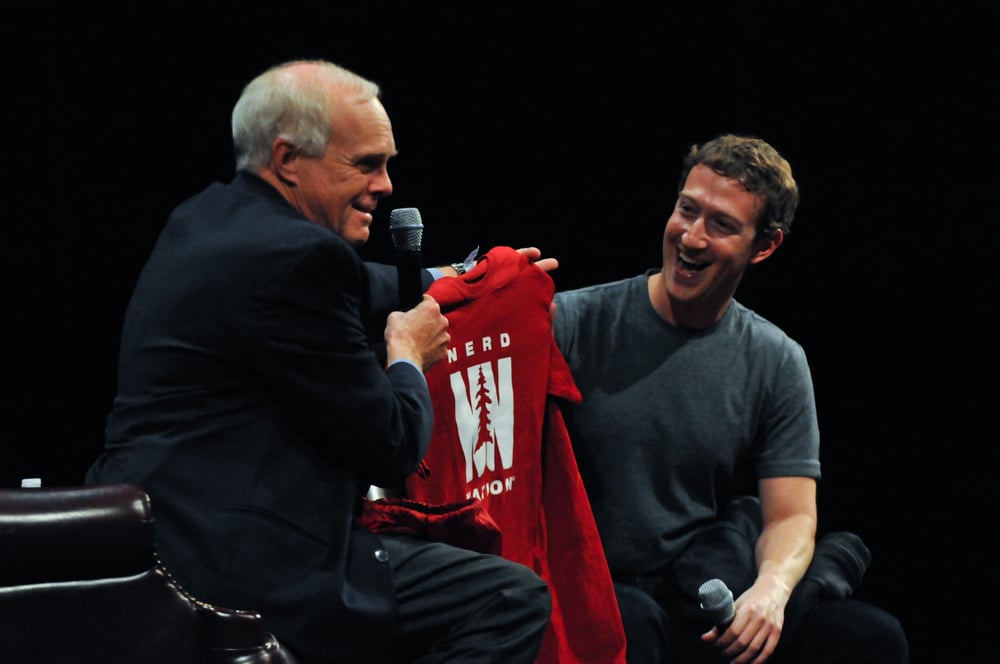
Facebook founder and CEO Mark Zuckerberg and Stanford President John Hennessy came together for a conversation in front of a packed Memorial Auditorium on Tuesday, covering a wide range of topics including their similar backgrounds as tech pioneers and their mutual appreciation for the humanities in engineering.
Senior Assistant to the President Jeff Wachtel ’79 helped organize the talk, stressing the effectiveness of the event’s unscripted format.
“The idea is to have [the conversation] be as fresh and spontaneous as it can be,” Wachtel said. “The idea makes for a more interesting and enjoyable session than a scripted one, with really honest responses to issues and questions.”
During the talk, Zuckerberg shared his former and current aspirations for Facebook. He spoke of how the company originated in a conversation over nightly pizza with his close friend at Harvard when they discussed the likelihood of building a social network for the world. At the time, however, they had not thought much about their role in such a network.
“It didn’t cross my mind that we’d be the people to do it,” Zuckerberg said. “There were all these other companies that had experiences and tens of thousands of engineers … I assumed that one of them would go on to build this.”
Zuckerberg’s vision for the company for the last six years has been to connect one billion people, one of their “craziest” goals said Zuckerberg. He later added, “no one really took [the goal] seriously.”
The company surpassed the milestone about a year ago. The multibillion-dollar social network now has its sights set on connecting everyone worldwide.
Zuckerberg noted that two-thirds of the globe still has no access to the Internet, a fact that he is concerned about given that pooling people’s knowledge together can solve problems.
“We are robbed of an opportunity to benefit from the communication that all those folks will bring,” he said.
Hennessy and Zuckerberg also discussed their respective career paths that they found to be similar.
Hennessy joined Stanford as an electrical engineering professor in 1977 and moved up the ranks as director of Stanford’s Computer System Laboratory, chair of the Computer Science Department, dean of the School of Engineering, provost and now president. A pioneer in the field of computer architecture, Hennessy helped found MIPS Computer Systems, Inc. (now MIPS Technologies, Inc.), a semiconductor design company.
Zuckerberg excelled starting at a young age, as he learned Atari BASIC Programming from his father in middle school, took a graduate-level computer programming class in high school and became founder and CEO of his own social network in college.
Anton Apostolatos ’16, a computer science major, noted the tech giants’ career crossovers.
“Hennessy comes from an academic standpoint, while Zuckerberg is a drop-out who did his own thing,” Apostolatos said. “They’re two very different sides of the same coin.”
While that is a very tech-centric coin, Zuckerberg himself harbors an appreciation for the humanities alongside his savvy computer skills. He earned a diploma in classics in prep school, has reportedly quoted lines from Virgil’s Roman epic poem “The Aeneid” at a Facebook product conference and was pursuing a psychology major while at Harvard.
During the talk, Zuckerberg discussed the dichotomy of the technical and humanities-based fields — a divide that is no secret at Stanford.
“A lot of times, interesting work is done at the intersection of the two,” Zuckerberg said. “One thing you learn in college is what problem to pick to solve, rather than how to solve these problems … [and] being able to look across disciplines and pick problems that are real rather than only focusing on technology.”
Students appreciated hearing technology giants Hennessy and Zuckerberg both talk about bridging the gap between technology and humanities.
“I came [to the conversation today] because I am a humanities major and don’t know much about the tech world,” said Asia Chiao ’15. “I appreciate what [Zuckerberg] said about bridging the gap that is so vividly illustrated at Stanford with the fuzzy-techie divide.”
Contact Jenna Shapiro at jennshap ‘at’ stanford.edu.
